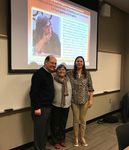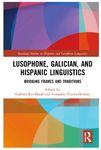PORTUGUESE POET ANA LUÍSA AMARAL VISITS UWM
←
→
Page content transcription
If your browser does not render page correctly, please read the page content below
Newsletter Fall 2019
DEPARTMENT OF SPANISH AND PORTUGUESE
UNIVERSITY OF WISCONSIN-MILW AUKEE
PORTUGUESE POET ANA LUÍSA AMARAL VISITS UWM
By César Ferreira
Portuguese poet Ana Luísa Amaral held a poetry
reading and conversation at UWM on October 15th, 2019.
She was hosted by Susana Antunes and César Ferreira.
A leading voice in contemporary Portuguese
literature, Amaral’s works include 30 books of poetry, a play,
a novel, essays, and children’s books. Translated into over
20 languages around the world, Amaral’s most recent book
is the collection of poetry What’s in a Name, translated into
English by Margaret Jull Costa and published by New
Directions in New York in 2019.
An accomplished translator herself, Amaral has
published renditions of the poetry of Emily Dickinson,
William Shakespeare, and John Updike into Portuguese.
She is the recipient of several national and international
awards and teaches at the University of Porto, where she
has conducted research in Comparative Poetics, as well in
Feminist and Queer Studies.CAMÕES – INSTITUTO DA COOPERAÇÃO E DA LINGUA
By Kathleen Wheatley
The Camões Institute for Cooperation and Language celebrated its 90th anniversary in
2019, although its missions and names have evolved over these years. Since 1929, the
Portuguese Government has had an institute that focused on language and culture. In 1992, the
Camões Institute was created to take on this mission, as well as the added mission of promoting
Portuguese education around the world. In 2013, the Camões Institute merged with the
Portuguese Institute for Development Support, which provides development assistance
to the Portuguese-speaking African countries (Angola, Cape Verde, Guinea-Bissau, Mozambique,
and São Tomé and Príncipe) and East Timor. Since then, the Camões Institute for Cooperation
and Language has three branches that focus on cooperation, culture, and language throughout the
world both in Portuguese-speaking and non-Portuguese speaking countries.
In 2019, the College of Letters & Science at the University of Wisconsin-Milwaukee entered
into a cooperative agreement with the Camões Institute for Cooperation and Language, thanks to
the efforts of Susana Antunes in the Department of Spanish and Portuguese. The Portuguese
government will be providing financial support to promote Portuguese Language and Cultural
Studies at UWM, and as a result, UWM was able to reinstate its tenure-track position in
Portuguese.
Professor Kathleen Wheatley met with the Director of Language Services, Dr. Rui Vaz, in
Lisbon, Portugal this fall to thank him for the Institute’s generous support of the Portuguese
Program at UWM.
2Newsletter Fall 2019
NEWS FROM PORTUGUESE 360 STUDENTS
Edited by Allison Libbey
Students in this fall’s PORT 360 “The Visual Arts of the Lusophone world” got to attend
several workshops and presentations on campus. Below are the reactions of four of our students
to different events organized by Professor Susana Antunes.
“On October 7, Professor Ermitte Saint Jacques from UWM’s African and African Diaspora
Studies Department gave a wonderful and insightful presentation on African in Brazil: Candomblé
Art and the Public Sphere, allowing all the class to learn more about the African diaspora and the
deep spirituality within Black cultures from a global perspective. I think it's important for us students
to learn about religions like Candomblé and Vodou, and to destigmatize negative connotations and
stereotypes about these religions. Many thanks to Professor Antunes!” - Nia Wilson
“On October 12, I attended a samba workshop led by Armando Duarte from the University
of Iowa and overall it was an incredible experience. We learned Samba dance moves for 5 hours
in total, which was a bit hard on my feet afterwards but so great for my soul! I met and connected
with people of all backgrounds and ages in our community. Professor Duarte made it easy for
beginners and experts alike to learn the dance. Later that week in PORT 360, he taught us more
about the history of Samba and aspects of Brazilian Carnival. It was so intriguing to me that
Samba has influences from so many traditions. I highly encourage anybody and everybody, (even
non-Portuguese speakers like me) to attend events like this in the future.” - Sadaf Z Babwari
“Our class has been discussing different art styles throughout history in the Lusophone
world, and it was fascinating to see some of the characteristics during our visit to Special
Collections on October 21. Our class talked with
Special Collections Librarian Max Yela, who
informed us that the collection is comprised of
“facsimiles,” or exact copies of written and printed
material. Everything inside the books is
duplicated, including flaws! These ancient books
are made to not only look like the original, but also
give the user the same experience while handling
them. To see these books and interact with them
is really a unique experience - I was so inspired
by these ancient books that I decided to use them
as a topic for my final project!” - Victoria Lilly
“Daniel Marques, a Fulbright Scholar from Brazil doing research at UWM, came to our class
on November 11 to teach us about a Brazilian practice in Bahia, called the tying of the “Fita do
Senhor do Bonfim.” It’s a ribbon-like bracelet that is tied onto one’s wrist or ankle, and with each
tie, the wearer is supposed to make a wish. After three ties, you then wear it until it comes off by
itself. It is said that once the ribbon falls off, your wishes will have been realized. The visual effect
of this tradition is related to the enormous number of ribbons outside the church, and the result of
the vibrant colors of the ribbons moving with the wind.” - Ryan Jay AmmermanFACULTY AND STAFF NEWS
Susana Antunes translated from Spanish to Portuguese the poetry book As Quatro Estações da
Poesia, by Margara Russotto. The book was launched at the Modern Language Association
International Symposium, Lisbon, July 23-25, 2019. She also chaired panels at that conference,
entitled “Ilhas de Vozes em Reencontros Compartilhados I, II.” In September she was invited to
attend the International Conference “Sena & Sophia: Centenários” in Rio de Janeiro, where she
presented a paper entitled “Jorge de Sena e Cecília Meireles: o encanto dos contrastes”.
Nancy Bird-Soto presented “Lo familiar y el extrañamiento en Mis memorias de Alejandro Tapia y
Rivera” at the Midwest Modern Language Association Conference in Chicago, Illinois (November).
She continues to Chair the UW Spanish Placement Exam Committee and be an invited columnist
for Revista Cruce.
César Ferreira published the article “Julio Ramón Ribeyro: La palabra que perdura” in Quimera-
Revista de Literatura 427-428 (julio-agosto 2019): 15-18. He also published a review on Jorge
Eduardo Eielson’s collection of poetry “Room in Rome” in Latin American Literature Today Vol. 1
No. 12 (2019). Ferreira authored the prologue “Edgardo Rivera Martínez, lector de César Vallejo”
for the volume: El paisaje en la poesía de César Vallejo by Edgardo Rivera Martínez. Lima: Fondo
Editorial Universidad Ricardo Palma, 2019: XIII-XVI. Additionally, he published “César Vallejo y
sus Poemas humanos” as a prologue to a facsimile edition of César Vallejo’s Poemas humanos
(1923-1938). Lima: Universidad Ricardo Palma, 2019: 15-19. Ferreira gave four talks at Peru’s
24th Feria Internacional del Libro in July 2019: “Encuentro en el mundo andino: En torno a El
paisaje en la poesía de César Vallejo, de Edgardo Rivera Martínez;” “Sobre César Vallejo y
sus Poemas humanos;” “La poética de la ficción de Mario Vargas Llosa;” and “Historia de una
amistad: Ernest Hemingway y Alfredo Bryce Echenique.”
In May, John McCaw chaired two panels and presented a paper, “Wanderings and Awakenings:
The Labyrinth of Crete and Spirituality in Colonial Spanish America," at the Mediterranean Studies
Association conference in Greece. He also organized and chaired three panels for the Spanish I
(pre-1700) Session at the Midwest Modern Language Association conference, held in November in
Chicago. On one of the panels he presented a paper, "The Belly of the Beast: The Labyrinthine
Underworld in Lope de Vega's El villano en su rincón."
Gabriel Rei-Doval published his co-edited book Lusophone, Galician and Hispanic Linguistics on
June 19. The printed version of the book was published by Routledge. He also
organized the 7th Lusophone and Hispanic Linguistics Symposium, held at UW-
Milwaukee on November 8-9, 2019. During his sabbatical last year, he delivered
two conference presentations: “A lingua galega e o Camiño de Santiago: o
contexto norteamericano,” an invited presentation at the I Simposio Internacional
Os Estudos Galegos Camiño do Xacobeo 21 in Santiago de Compostela in
December of 2018, and “Top-Down and Bottom-Up Language Planning in Galicia:
Can School Alone Reverse Language Shift?” at the Modern Language Association
Annual Conference in January of 2019 in Chicago IL. Finally, his autofictional
memoir was published in August 2018 on the main online Galician
newspaper Galicia Confidencial (http://www.galiciaconfidencial.com/tema/viaxes-sen-lee).
4LETTER FROM THE CHAIR
It has been an exciting autumn with several events hosted and/or co-sponsored by the
Department of Spanish and Portuguese. Every semester I witness the dedication of our faculty and
staff, so I want to extend them my gratitude for everything they do for the Department and our
students. As you can see in this edition of Apuntes, our Portuguese program has received a
significant boost this year with now Assistant Professor Susana Antunes.
For updates on lectures and other events sponsored by the Department, be sure to join our
Facebook Group: and visit our website at:
https://uwm.edu/spanish-portuguese/category/news. I also invite you to consider making a
donation to one of the funds listed on our website at: https://uwm.edu/spanish-portuguese/give/.
Thanks to Prof. Allison Libbey for being our newsletter editor.
Wishing you an uplifting holiday season,
Nancy Bird-Soto
Chair
Left: Playa de Guajataca and flamboyán trees in the background
Right: Old train route by Guajataca Tunnel, Quebradillas, Puerto Rico
Photos by Nancy Bird-Soto, June 2019
5You can also read
























































